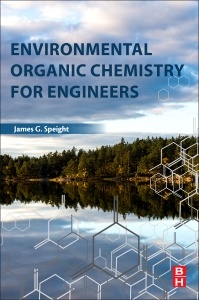Description
Environmental Organic Chemistry for Engineers
Author: Speight James G.
Language: English
Subjects for Environmental Organic Chemistry for Engineers:
Keywords
organic molecules; Agrochemicals; Industrial chemicals; Flame retardants; Process by-products; Organic chemistry; Remediation Technology; Chemical Distribution; Molecular interactions; Environment Transformation; Nucleophilic Reactions; Reduction Reactions; Oxidation Reactions; Thermal desorption; Excavation or dredging; surfactant enhanced aquifer remediation; Solidification and stabilization; Soil vapor extraction
Support: Print on demand
Description
/li>Contents
/li>Readership
/li>Biography
/li>Comment
/li>
Environmental Organic Chemistry for Engineers clearly defines the principles of environmental organic chemistry and the role they play in forming remediation strategies. In this reference, the author explores parameter estimation methods, the thermodynamics, and kinetics needed to predict the fate, transports, and reactivity of organic compounds in air, water, and soils.
The book's four part treatment starts with the classification of organic molecules and physical properties of natural organic matter, halocarbons, phenols, polyaromatic hydrocarbons, organophosphates, and surfactants. An overview of remediation technologies and a discussion of the interactions that lead to physical properties that affect chemical distribution in the environment is also detailed, as are the important reaction classes of organic molecules, including substituent effects and structure and activity relationships found in Part Two and Three. Part four is devoted to the strengths and weaknesses of different remediation technologies and when they should be employed.
Chapter 1: Chemicals and the Environment
Chapter 2: Organic Chemistry
Chapter 3: Industrial Organic Chemistry
Chapter 4: Sources and Types of Organic Pollutants
Chapter 5: Properties of Organic Compounds
Chapter 6: Introduction Into the Environment
Chapter 7: Chemical Transformations in the Environment
Chapter 8: Environmental Regulations
Chapter 9: Removal of Organic Compounds From the Environment
Environmental, Civil Engineers, Chemical Engineers, and Researchers
Dr. Speight is an author/editor of several databases and encyclopedic works. He has also authored more than 95 books as well as more than 400 publications, reports, and presentations detailing these research activities, and has taught more than eighty related courses.
- Clearly defines the principles of environmental organic chemistry and the role they play in forming remediation strategies
- Includes the tools and methods for classifying environmental contaminants found in air, water, and soil
- Presents a wide-range of remediation technologies and when they should be deployed for maximum effect




